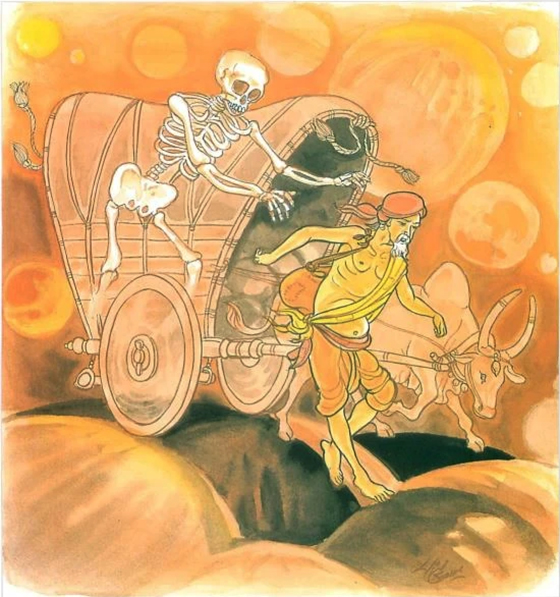The Story of Sumanadevi

(One who has done good deeds rejoices here and rejoices afterwards too; he rejoices in both places. Thinking “I have done good deeds” he rejoices, he rejoices all the more having gone to a happy existence.)
The Master while residing at Jetavana delivered this religious discourse beginning with “Here (in this world) one who has done good deeds rejoices” in connection with Sumanadet Savatthi, two thousand monks used to take their meals daily in the house of Anathapindika and a similar number in the house of the eminent female-devotee Visakha. Whosoever wished to give alms in Savatthi, they used to do so after getting permission of these two. What was the reason for this? Even though a sum of a hundred thousand was spent in charity, the monks used to ask:
“Has Anathapindika or Visakha come to our alms-hall?” If told, “They have not”, they used to express words of disapproval saying “What sort of a charity is this?” The fact was that both of them (Anathapindika and Visakha) knew exceedingly well what the congregation of monks liked, as also what ought to be done befitting the occasion. When they supervised, the monks could take food according to their liking, and so all those who wished to give alms used to take those two with them. As a result, they (Anathapindika and Visakha) could not get the opportunity to serve the monks in their own homes.
Thereupon, pondering as to who could take her place and entertain the congregation of monks with food, and finding her son’s daughter, Visakha made her take the place. She started serving food to the congregation of monks in Visakha’s house. Anathapindika too made his eldest daughter, Mahasubhadda by name, officiate in his stead. While attending to the monks, she used to listen to the Dhamma. She became a Sotapanna and went to the house of her husband. Then he (Anathapindika) put Cullasubhadda in her place. She too acting likewise became a Sotapanna and went to her husband’s house. Then his youngest daughter Sumanadevi was assigned the place. She, however, attained the fruition of sakadagami. Though she was only a young maiden, she became afflicted with so severe a disease that she stopped taking her food and wishing to see her father sent for him.
Anathapindika received the message while in an almshouse. At once he returned and asked her what the matter was. She said to him, ‘Brother, what is it?’ He said ‘Dear, are you talking in delirium?’ Replied she, ‘Brother, I am not delirious.’ He asked, ‘Dear, are you in fear?’ and she replied, ‘No, I am not, brother.’ Saying only these words she passed away. Though a Sotapanna, the banker was unable to bear the grief that arose in him for his daughter and after having had the funeral rites of his daughter performed, approached the Master weeping. Being asked: Householder, what makes you come sad and depressed, weeping with a tearful face?’, he replied ‘Lord, my daughter Sumanadevi has passed away.’ ‘But, why do you lament? Isn’t death common to all beings?’ ‘Lord, this I am aware of, but the fact that my daughter, who was so conscious of a sense of shame and fear of evil, was not able to maintain her self-possession at the time of her death and passed away talking in delirium, has made me very depressed.’ ‘But, noble banker, what was it that she said?’
‘When I addressed her as “Dear Sumana”, she said “What is it, dear brother? “*
‘Then when I asked her “Dear, are you talking in delirium ?”, she replied “I am not talking in delirium, brother”.
‘When I asked her “Are you in fear, dear?”, she replied “Brother, I am not”. Saying this much she passed away.’
Thereupon the Master told him, Noble banker, your daughter was not talking in delirium.’ When asked why she spoke like that, the Master replied, ‘It is because of your lower spiritual position; indeed your daughter held a higher position than you did in the attainment of the path (magga) and fruition (phala); you are only a Sotapanna but your daughter was a sakadagami, it was because of her higher position in the attainment of path and fruition that she spoke to you in that way’. The banker asked, ‘Is that so Lord ?’, and the Master affirmed saying ‘It is so’. When asked ‘Where is she reborn at present?’ the Master said, ‘In the Tusita heaven, O householder’. Then the banker made this remark, ‘Lord, having rejoiced here in this world in the midst of kinsmen, now again, after passing away, my daughter has been reborn in a place of joy.’ Thereupon the Master told him, ‘Yes banker, the diligent, whether they are householders or samanas, surely rejoice in this world as well as in the next’, and uttered this stanza.
Idha nandati, pecca nandati,
katapunno ubhayattha nandati.
“punnam me katan” ti nandati
bhiyyo nandatisuggatim gato. Continue reading









